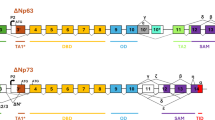Abstract
Two N-terminal isoforms characterize the p63 protein: the transactivating isoform TAp63 and the amino-terminal truncated isoform ΔNp63. Two further N-terminal isoforms lacking exon 4 (d4TAp63 and ΔNp73L) have been reported. Purpose of the study was to investigate the molecular expression of N-terminal p63 isoforms in benign and malignant breast tissues. Eighteen randomly selected cases of invasive breast carcinoma (IBC) of luminal type, two cases of in situ duct carcinoma (DCIS/DIN), and 20 specimens of normal and benign breast tissues were studied. All cases were immunostained for p63. Reverse polymerase chain reaction and nested PCR were performed to evaluate p63 N-terminal expression patterns. These isoforms whenever present were validated by sequencing. All cases of normal breast, benign lesions, and the two cases of DCIS/DIN expressed ΔNp63 and TAp63 isoforms only. The two variants lacking exon 4 (ΔNp73L and d4TAp63) were not found. All invasive carcinomas expressed the ΔNp63 and TAp63 isoforms as well as the two short isoforms lacking exon 4 which were found in 11 (d4TAp63) and four (ΔNp73L) cases. The present cases of luminal-type IBC showed p63 isoforms together with short variants lacking exon 4. These isoforms were not observed in non-neoplastic breast tissue. Presence of p63 in invasive breast carcinomas of luminal type, as seen at molecular level, suggests caution to include p63 as a marker of basal-like carcinomas.




Similar content being viewed by others
References
Levrero M, Laurenzi VD, Costanzo A et al (2000) The p53/p63/p73 family of transcription factors: overlapping and distinct functions. J Cell Sci 113:1661–1670
Strano S, Rossi M, Fontemaggi G et al (2001) From p63 to p53 across p73. FEBS Lett 490:163–170
Barbieri CE, Pietenpol JA (2006) p63 and epithelial biology. Exp Cell Res 312:695–706
Yang A, Kaghad M, Wang Y et al (1998) p63, a p53 homolog at 3q27–29, encodes multiple products with transactivating, death-inducing, and dominant-negative activities. Mol Cell 2:305–316
Lee HO, Lee JH, Choi E et al (2006) A dominant negative form of p63 inhibits apoptosis in a p53-independent manner. Biochem Biophys Res Commun 344:166–172
Foschini MP, Gaiba A, Cocchi R et al (2004) Pattern of p63 expression in squamous cell carcinoma of the oral cavity. Virchows Arch 444:332–339
Urist MJ, Di Como CJ, Lu ML et al (2002) Loss of p63 expression is associated with tumour progression in bladder cancer. Am J Pathol 161:1199–1206
Senoo M, Tsuchiya I, Matsumura Y et al (2001) Transcriptional dysregulation of the p73L/p63/p51/p40/KET gene in human squamous cell carcinomas: expression of Delta Np73L, a novel dominant-negative isoform, and loss of expression of the potential tumour suppressor p51. Br J Cancer 84:1235–1241
Foschini MP, Gaiba A, Cocchi R et al (2005) p63 expression in salivary gland tumours: role of DeltaNp73L in neoplastic transformation. Int J Surg Pathol 13:329–335
Di Como CJ, Urist MJ, Babayan I et al (2002) p63 expression profiles in human normal and tumour tissues. Clin Cancer Res 8:494–501
Wang X, Mori I, Tang W et al (2002) p63 expression in normal, hyperplastic and malignant breast tissues. Breast Cancer 9:216–219
Reis-Filho JS, Milanezi F, Amendoeira I et al (2003) Distribution of p63, a novel myoepithelial marker, in fine-needle aspiration biopsies of the breast: an analysis of 82 samples. Cancer 99:172–179
Barbareschi M, Pecciarini L, Cangi MG et al (2001) p63, a p53 homologue, is a selective nuclear marker of myoepithelial cells of the human breast. Am J Surg Pathol 25:1054–1060
Reis-Filho JS, Simpson PT, Martins A et al (2003) Distribution of p63, cytokeratins 5/6 and cytokeratin 14 in 51 normal and 400 neoplastic human tissue samples using TARP-4 multi-tumour tissue microarray. Virchows Arch 443:122–132
Matos I, Dufloth R, Alvarenga M et al (2005) p63, cytokeratin 5, and P-cadherin: three molecular markers to distinguish basal phenotype in breast carcinomas. Virchows Arch 447:688–694
Tavassoli FA, Devilee P (2003) WHO. Pathology and genetics of tumours of the breast and female genital organs. IARC Press, Lyon
Elston CW, Ellis IO (2002) Pathological prognostic factors in breast cancer. I. The value of histological grade in breast cancer: experience from a large study with long-term follow-up. Histopathology 41:154–161
Eusebi V, Magalhanes F, Azzopardi JG (1992) Pleomorphic lobular carcinoma of the breast: an aggressive tumour showing apocrine differentiation. Hum Pathol 23:655–662
Rakha EA, Putti TC, Abd El-Rehim DM et al (2006) Morphological and immunophenotypic analysis of breast carcinomas with basal and myoepithelial differentiation. J Pathol 208:495–506
Koker MM, Kleer CG (2004) p63 expression in breast cancer: a highly sensitive and specific marker of metaplastic carcinoma. Am J Surg Pathol 28:1506–1512
Tavassoli FA, Eusebi V (2009) Tumors of mammary gland. AFIP Atlas of Tumor Pathology. American Registry of Pathology, Washington
Foschini MP, Cocchi R, Morandi L et al (2008) E-cadherin loss and Delta Np73L expression in oral squamous cell carcinomas showing aggressive behavior. Head Neck 30:1475–1482
Acknowledgments
This paper was financed with funds from the Ministry of University and Research (MIUR) of Italy and University of Bologna (M. P. F. and V. E.).
Conflict of interest statement
We declare that we have no conflict of interest.
Author information
Authors and Affiliations
Corresponding author
Rights and permissions
About this article
Cite this article
de Biase, D., Morandi, L., Degli Esposti, R. et al. p63 short isoforms are found in invasive carcinomas only and not in benign breast conditions. Virchows Arch 456, 395–401 (2010). https://doi.org/10.1007/s00428-010-0900-1
Received:
Revised:
Accepted:
Published:
Issue Date:
DOI: https://doi.org/10.1007/s00428-010-0900-1




